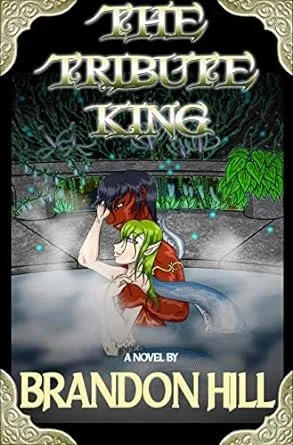SPSFC3 Author Interview - Brandon Hill
What inspired the world, characters, or core concepts of your story? Was it a particular event, piece of media, or a speculative scientific idea?
The world actually came from a dream I had. I vividly saw a map of the world, mostly desert, with fertile lands surrounded by impassible mountains in the far northern hemisphere, fed by rivers that came from the polar ice caps. After that, I mused on that world for quite some time before a story began to fall into place, probably born of my love of monster girls. Naga were a favorite of mine.
How did you approach the creation of your main characters? Were they modeled after real-life figures, or did they evolve organically as you explored the world of your story?
They kind of popped into my head pretty quickly: A spoiled human prince and kindly Naga princess. I saw their relationship change from antagonism into love, and all I needed to do was carve a path between those two points. I drew pictures of them and the story kind of molded itself around them after that.
Science fiction often delves into questions of ethics, technology, and humanity. What central theme or moral question does your story grapple with, and why did you feel it was essential to explore?
I don’t know if it’s a central theme, as the story revolves mostly around Voran and Salgani’s evolving relationship, but the addition of the creche and its history as a terraforming device that went out of control, resulting in the world as it is in my story, does give it a post-apocalyptic flavor that held a sobering reminder of the dangers in misuse of technology, especially how the kingdoms of the Plenteous Lands seek to weaponize it to their own desires. It paints a picture of man’s inhumanity to man and how it drives many to forget their pasts and seek ends that would only result in mutual self-destruction with technology that nearly brought it about before. If we forget the sins of our past, we are doomed to repeat them. I felt that that was a good lesson to weave into the story, even if it is not exactly central.
How did you approach the integration of futuristic technology or scientific concepts in your story? Did you base them on existing theories or let your imagination run wild?
Terraforming is still a thing of science fiction, though we do have ideas of how we could go about it. I simply had an idea of it being sped up in a way that could make it both useful and horrendously dangerous if misused. I was inspired by the anime, Origin: Spirits of the Past, where sapient trees engineered from an attempt to create plant life that can survive in the harshest environment, destroy the moon and travel to earth, creating a massive forest that humans must learn to live in harmony with. A somewhat similar fate befalls the world of my story, transforming it to a world of extremes by the misuse of the creche, which overrides the entire biosphere, radically altering the world both on the surface and underground.
The sci-fi genre provides a canvas to depict diverse cultures, species, and worlds. How have you incorporated representation and diversity in your work, and why do you think it's vital for the future of science fiction?
For me, diversity isn’t so much important as telling a good story. I already imagined the prince and the desert tribes as having darker skin regardless, and the Naga, due to their subterranean world, as being extremely fair complexioned. However, taking a cue from Octavia Butler, I realized that sci-fi is about humanity as a whole, so that does require being mindful of the many kinds of people living in our world, and paints a more realistic view of humanity in stories where such things are a vital element.
Every author has a unique writing process. Can you share a bit about yours? How do you manage world-building, plot progression, and character dynamics in such a complex genre?
My stories come together in many different ways. Only a couple of stories I have written, including The Tribute King, have come from dreams. But other stories have just been me being inspired by something I saw in a TV show/movie/comic, or read in a book, and the world just forms itself around the most interesting elements of that story. As a writer, I’m what is called a “pantser,” meaning that I write more “by the seat of my pants,” than any formal planning process. I have always had a fertile imagination, so as I write, my story often weaves itself on the fly, putting itself together, world-building included. Not to brag, but it is because of this that writer’s block is not really a problem for me. I simply have a talent for constructing complex worlds this way just letting my imagination flow.
What's next for you after SPSFC? Are there any upcoming projects you can share with us?
My coauthor and I have been busy putting together Wild Space Saga: a space opera action series that we have been hard at work at over the past few years. We have two main books and two anthology books released, and are nearly done with book 3. Outside of that, I am working on a second book in my War of Millennium Night vampire romance series, as well as building the story for an epic fantasy project that I have tentatively titled Children of Dragons.


